Rantview: Urbek
Urbek is a city-building game that separates itself from its more famous cousins by having a flat environment and a 3D-pixel style. Voxels, I suppose? Voxelated?
It is not, one would assume, reason to give a long-dead newsletter another poke. Why would I waste what might be my last e-mail in such a way?
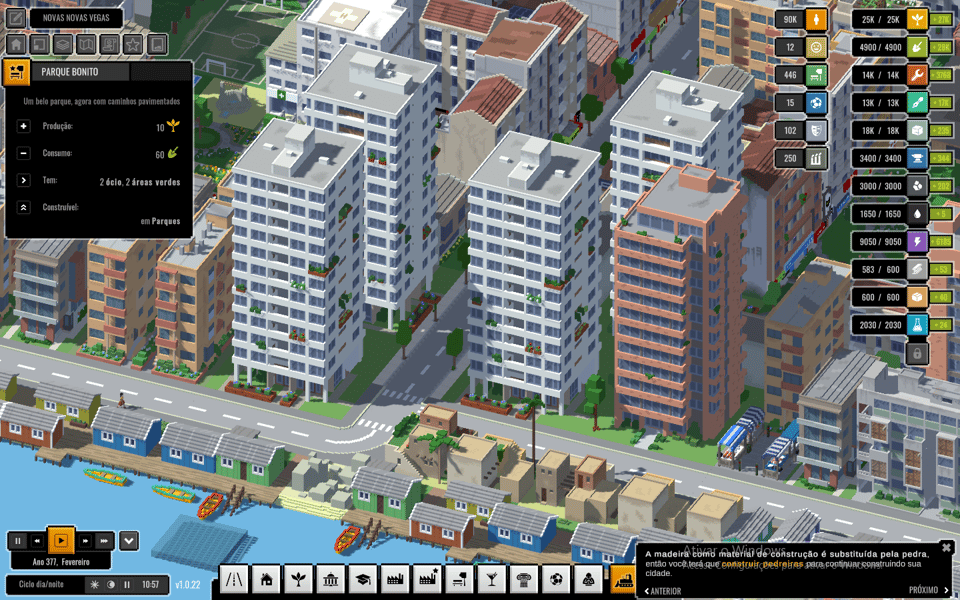
Party it's because it's my newsletter and I'll do what I want, fuck you, but mostly it's because the game seems to be in close conversation with my very first issue, on the effects of capitalism on game design. In that ancient text I talk about how the idea that building games are about spending value to create value tends to poison games that shouldn't be about monetary extraction, like Surviving Mars and Tropico. I also talk about Rise of Industry, a game that is graphically very similar to Urbek while also being its polar opposite.
Rise of Industry is obsessed with two things: money and logistics. Urbek has neither. (Almost. I'll get back to it.)
The other games have centered their gameplay on the concept of increasing your money, when they shouldn't have. Urbek, instead, has no money. No concept of money whatsoever. Even though, as a city-builder, it kinda should!
Let me bring you back to the first day I played Urbek. I was on holidays and had a hunkering for some buildin'. I had bought Urbek some time before and had heard it was good, so I fired it up pretty much blind. I start the game and it tells me to build a road, some farms, and some dwellings. The road is a dirt road and the dwellings soon become simple wooden shacks. I become confused. I thought this was a modern city builder, but I guess it's what, medieval?
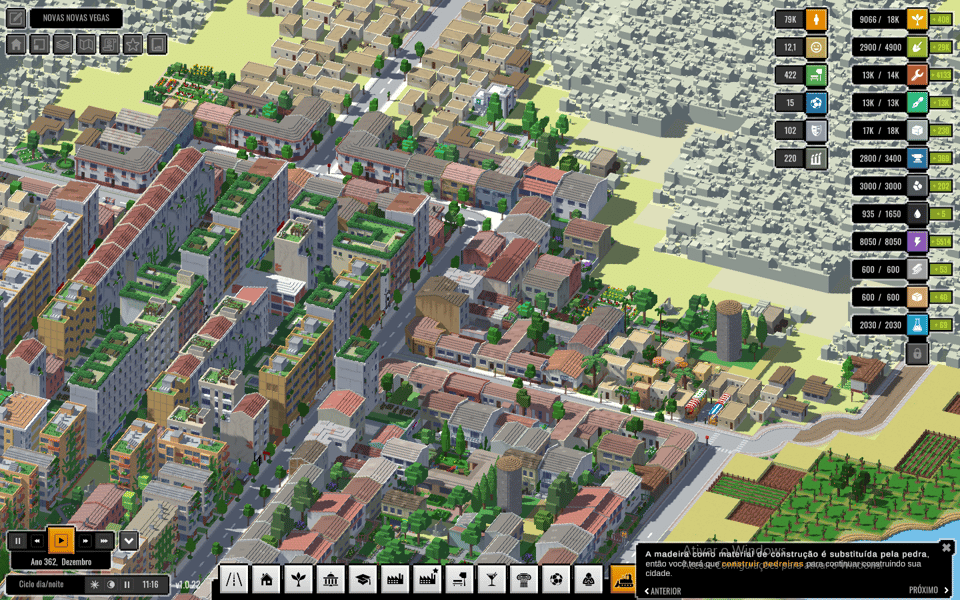
Urbek is about building a city in a different way. Most of the structures you build have certain requirements that change what it does and let it 'evolve' into different things. The dwellings are central to this experience and have the most changes. Without any requirements, you have but simple wooden shacks - they give you little, but take little back as well, since they don't even need electrical power. But as you give them what they need - shops, schools, green areas, bus stops, a walkable neighbourhood - they'll grow and change, all the way to the 12-story residential building, the densest residential building in the game.
But there are other ways to change your dwellings. Place a dock near them, and if they're near water they'll become fishermen's huts - colourful little shacks that provide food, a very scarce resource in this game. If you've got a neighbourhood you can't afford to grow too much, you've got alternatives. Create a statue and you can turn it into a lively artists' quarter. Place a chapel and turn it into a stoic religious neighborhood. Or, if you want to do the minimal, placing a playground will create a 'poor suburban house' - which doesn't give you more than other poor dwellings, but, again, takes less.
And you do all of that with no money.
Which is not to say Urbek has no currency. It actually has plenty of them. The most used is labour. Houses generate labour: that's what you build them for. Poor houses generate unspecialized labour, richer houses also generate specialized labour, the richest generate highly specialized labour. Building things usually requires a large dollop of labour, which gets refilled very quickly in most cities; many things, like farms for instance, also require constant labour.
Currencies also include the materials you need to build: wood from sawmills, coal and iron from mines, steel from steelworks. They also include some more... abstract notions. Schools generate education. Libraries generate culture. Green areas generate... well, it's called 'green areas'. Remember logistics? Logistics are also one of these currencies, generated by outhouses. The one currency you won't find anywhere is actual currency, money.
This immediately creates a very different, very strange experience playing a city builder. In most games of this kind - hell, in most games with any kind of economy - you can spend very large amounts of money as a quick fix-it. If your city needs more power, just build the most expensive power plant. Maybe you can’t actually run it forever, you can’t afford its upkeep costs, but it’ll stop your citizens from complaining until you can unlock a cheaper, more efficient power plant. Run out of a crucial resource? Buy it until you can balance your reserves. Citizens angry about something? Buy their temporary happiness back with funfairs, parades, whatever the game lets you use, until you manage to get back on track. And I’m not even talking about taking loans. You can use money to get anything, even money!
Not in Urbek. There’s no money here. If there’s a hole in your city, you’ll have to live with that hole until you fix it. If a resource is missing, tough luck! Find a way around it. Change your policies, destroy your buildings. Load an earlier save. Find a way.
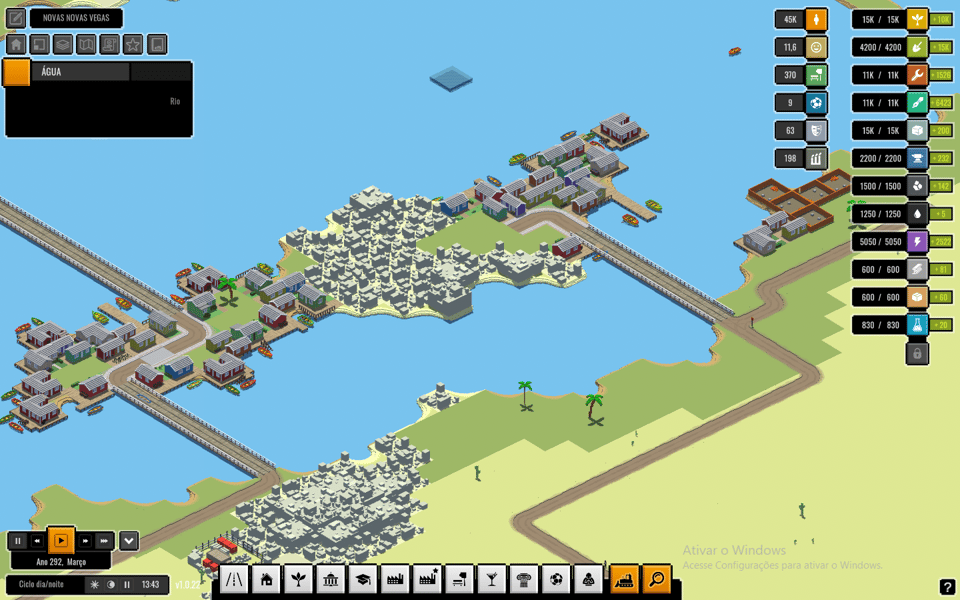
This may sound entirely harsh, and it is. Sometimes, you can get stuck into a loop. You can’t build any more advanced buildings because you’re running out of power. You could upgrade your current power station by building warehouses near it - but you can’t build warehouses because they require power. You could build a better power plant, but it requires steel, and you’re running out of steel too. And you can’t build a new steelworks because that requires power. And you can’t upgrade your current steelworks because you need to build warehouses to do that, and you don’t have enough power.
(Actually, only after having all these thoughts I realized that there’s a toggle in the game that allows you to spend more of a resource than you’re generating, as long as you have some reserves, so this entire rant goes nowhere.)
So, what do I think about this annoying, pushy city builder? I love it. It’s such a refreshing, different experience. One thing that I love is that higher-level buildings require resources that are generated by other higher-level buildings, so you end up with a highly developed city center that peters out into small suburbs. It’s an incredibly naturalistic look that the game generates effortlessly through its rule set. And, of course, for someone who complained about capitalism in city builders, the game is perfect. It wants to get rid of capitalism so bad it threw the capital away with it!
This seems like a perfect spot to end this missive, but I have to be honest with y’all. That would be misleading. Because it would imply that I want an anti-capitalism game so badly, I’m turning a random game into it simply because it has a wacky approach to currency. So, before we end this newsletter, we need to talk about anarchists.
Another thing that Urbek does that I really like is that it doesn’t let you trick yourself into thinking the neat separation between highly-polluting industries and beautiful residencial suburbs is natural, or even possible. One of the resources required for high-level industries are people. Specifically, a certain amount of nearby squares with a certain population density, meaning you can’t even build a single residential tower and call it a day. But dwellings built next to certain industries because special dwellings that increase its output - crowded, ugly miners’ houses, the only non-slum dwellings that can be built on squares tainted with pollution.
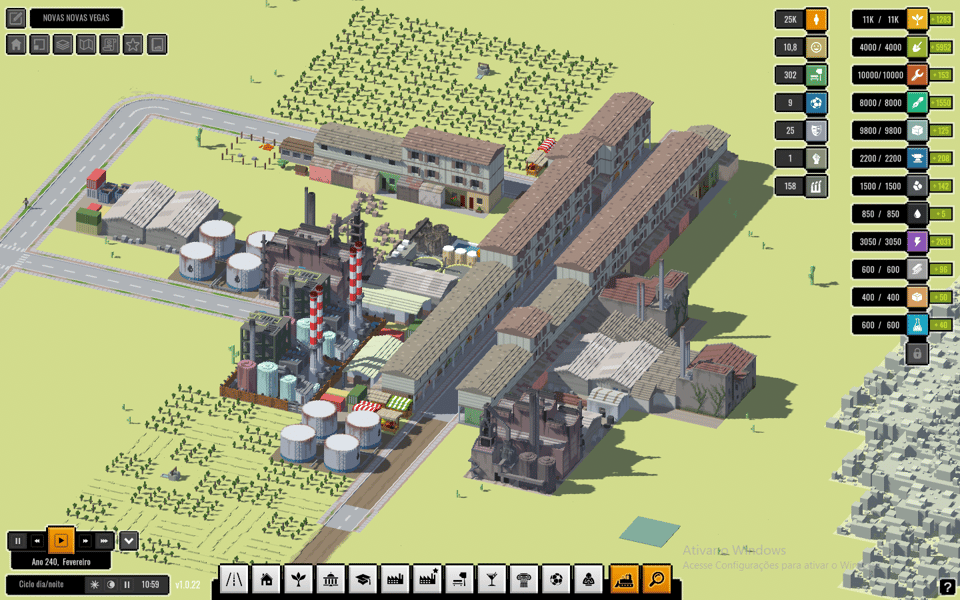
Oh yeah, the game also has slums. They pop out if you build dwellings in squares with polution that can’t be miners’ houses. Since all other dwellings cannot exist with pollution, misjudging the reach of a polluting industry will cause any other dwelling to degenerate into this. And if you have a lot of slums nearby, you’ll end up crating a rebel house.
The first time I saw a rebel house, I thought I knew what was going on. It was just like Tropico, right? Your unhappy citizens in Tropico rebel against you and will attack your city, destroying infrastructure. That’s a bad thing.
In Urbek, it’s not bad at all. Rebel houses are just houses. And they generate self-organization, a resource that usually requires highly specialized buildings, such as the anarchist bar and the anarchist library, and that allow you to build the anarchist commune, a building that houses a great number of people and even generate food. (Food is quite scarce in this game, remember?)
Smarter people than me have already talked about how the roadmap of city builders is a mechanization of certain (neo)liberal schools of urbanism, those that see cities as great machines to grind people into value, who think the vigilance state needs to be built into the very foundation. Urbek, in a very simple manner, rejects those premises. It’s interested in thinking of what a self-sufficient, self-governed city would look like. You never need to build a single police station in Urbek. You can, but why would you? They stop you from building anarchist communes, and those are so much better.
I don’t think Urbek has given us a magical map towards a new kind of urbanism. I don’t think it’s even given us a magical map towards a new kind of city builder. But it’s asking the right questions, and it’s letting us have a lot of fun with the answers.
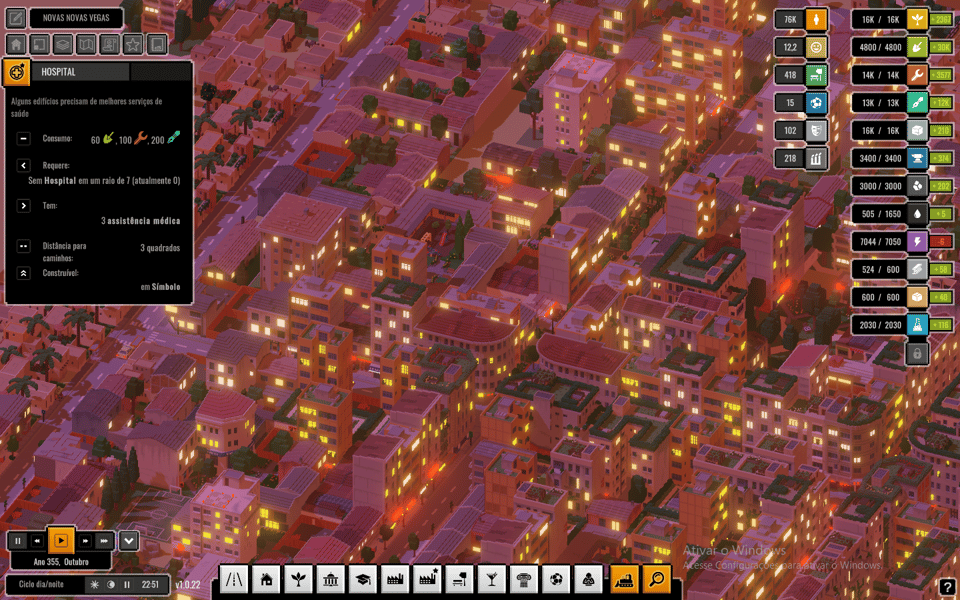
Thank you all for hanging out with me for this little soujourn back into activity. This newsletter will now return to its previously scheduled slumber, although you can read all of its issues in the archive. One day, it may again stir…